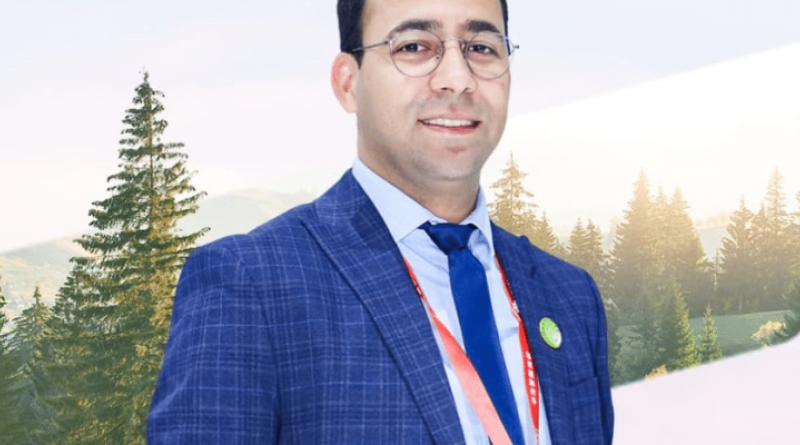For over two decades, Huawei has been a key player in Africa's digital transformation, developing solutions tailored to local needs. In this interview, Ahmed Rouizem, CTO of Smart PV Business at Huawei Northern Africa (North, West and Central Africa), reveals the secrets behind Huawei's success on the continent. By adopting a holistic approach, providing local training, and developing sustainable energy solutions, Huawei is dedicated to supporting economic growth and the transition to renewable energy in Africa.
Afrik 21: How did Huawei succeed in Africa?
Ahmed Rouizem: Our success relies on a solid understanding of local factors, which stems from our philosophy “In Africa, for Africa”. Everything the company implements aims at a single goal: strengthening the continent’s economic growth by contributing to the development of a high-performing digital economy. Huawei has been operating on the African continent for over two decades, which has given us a deep understanding of the unique needs and challenges faced by each country. This extensive experience allows us to develop tailored and effective solutions that address the specific expectations of local populations. We are also strongly committed to skills transfer and training, with the goal of developing a qualified African workforce to support the continent’s digital transformation.
Consistently adhering to a win-win approach, Huawei has built trust-based relationships with its local partners over the years. We deliver superior solutions to enhance their market competitiveness. To this end, we provide advanced ICT infrastructure and develop products and solutions to digitize strategic sectors such as finance, education, agriculture, health, and green energy.
What is Huawei’s vision in Africa?
Our vision is fundamentally holistic. We cannot develop one vertical without focusing on another. This means that significant efforts are required, particularly in terms of infrastructure to improve connectivity in territories, as well as data infrastructure (cloud platforms, data centers) …
We have developed our Digital Power activity to further this holistic digital and carbon-free vision. It demonstrates our commitment to supporting renewable energy development, particularly solar energy through battery energy storage systems (BESS), aiming to create a more reliable, secure, and efficient renewable energy system. For us, the digital transition must be decarbonized and sustainable while contributing to economic growth.
Regarding Digital Power, what are its key advantages in Africa?
As a reminder, Huawei has been involved in the solar business for more than 10 years. In 2021, Huawei established a dedicated entity, “Huawei Digital Power”, to accelerate energy digitalization and economic decarbonization. For many years, we have been commencing the strategic and operational growth of this business across the African continent. We prioritize the quality, safety, reliability, and after-sales support of our products above all else. Every energy solution is rigorously tested to ensure optimum performance and durability, even under the most challenging conditions. Our systems ensure a stable, continuous supply of electricity with grid support, increasing system availability and maximizing productivity. This is a critical factor for businesses and communities in Africa that often face power outages.
Beyond technological performance, we invest in local talent development, creating jobs, and building skills on the continent. This reflects our mindset, which emphasizes the importance of building sustainable collaborations with our partners in the Northern Africa region. Our mission is to provide quality products while enhancing the technical skills of our partners. We are committed to cooperating in a way that benefits all stakeholders, following a win-win partnership model.
Our local presence and comprehensive services platform offer support at every stage of our solutions’ lifecycle, from design to operation and maintenance. This includes technical assistance, training, and after-sales support, ensuring customer satisfaction. By combining quality, reliability, safety, local involvement and impeccable customer service, Huawei Digital Power is helping our customers and partners move forward in Africa’s digitization process. We are committed to meeting the continent’s current and future energy needs by integrating digital and power electronics technologies, developing clean power, and enabling energy digitalization to drive the energy revolution towards a better, greener future.
Indeed, the transition to green energy in Africa faces numerous challenges. What are they?
The challenges are plentiful and complex. First, the national electrical grid in Africa is critical. Infrastructures are often outdated and fragile in some areas, with insufficient capacity and stability. This results in significant disparities: while some countries boast nearly 100% electricity access, others still struggle to provide adequate power to their populations. In 2022, around 600 million people in sub-Saharan Africa still lacked access to electricity, according to the International Energy Agency (IEA). Large-scale development of renewable energies is impossible without an efficient electricity grid. However, restoring these infrastructures involves immense costs because African energy projects have higher financing costs than those in developed markets. Moreover, investors perceive increased risks linked to political instability, economic fluctuations, and insufficient infrastructure, leading to higher borrowing costs.
Solutions do exist to address grid weaknesses and optimize renewable integration. Grid-forming batteries, for example, play a crucial role in stabilizing and managing power grids, particularly with intermittent sources like solar and wind. Unlike traditional batteries, they provide consistent frequency and voltage references, ensuring grid stability. However, their adoption remains limited. To accelerate this, it is essential to raise awareness of their benefits and develop the expertise needed for large-scale deployment. The current shortage of skills in this field poses a significant obstacle. Implementing dedicated training programs and strengthening local capacities are essential steps to bridge this gap and ensure sustainable sector development.
What concrete solution demonstrates Huawei’s commitment to decarbonization?
Huawei supports its partners in addressing a dual climate emergency in Africa: accelerating access to energy and increasing the share of renewables in the energy mix in both the private and public sectors in order to reduce dependence on fossil fuels and promote clean energy in both the private and public sectors. To achieve this, we offer a range of solar inverters and battery storage solutions, designed for a wide variety of scenarios.
Among our flagship solutions is a unique, competitive hybrid system (PV+ESS) capable of microgrid operation with black start capabilities. This technology offers numerous advantages, including the ability to operate without a grid connection, making it particularly beneficial for rural electrification and some sectors such as the mining industry and factories.
Facing the major challenge of decarbonizing industries, we believe digital technologies are key to this transformation. By combining our digital power products & solutions with our ICT expertise, we can offer connected energy products that meet today’s energy challenges while paving the way for a greener future.
For Huawei, technology, green energy, and sustainability go hand in hand, and every innovation must contribute to a more sustainable and inclusive world. We are not just following the energy transition, we are defining it.







